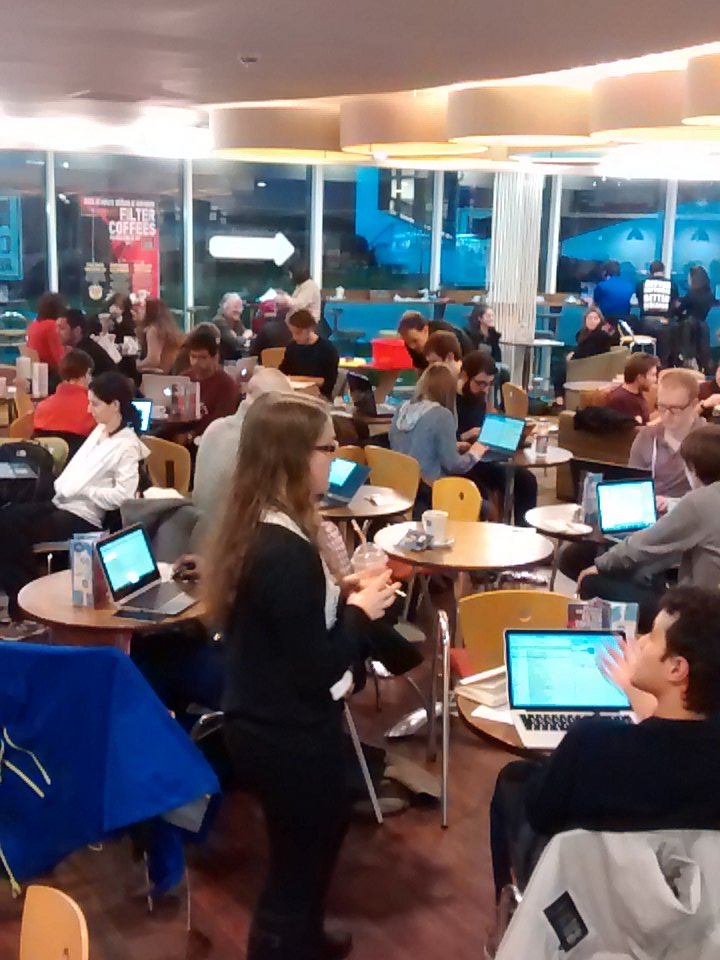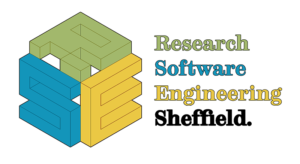Search Results
A couple of weeks ago, a small group of us hit on the idea of running research programming tutorials in a cafe. The ‘plan’ was that we’d develop some self-paced programming tutorial material, take over a section of the main campus Cafe (Coffee Revolution) for a couple of hours in the evening and invite some researchers to come and learn something new for free.
For our first session, we chose to do a very gentle introduction to R. The students worked through the material, which started right at the beginning with installing R and RStudio, while a group of volunteer facilitators walked the room answering questions, solving problems and forming collaborations.
I can’t stress the importance of the facilitators enough! There is no chance that this format would have worked well without a group of skilled facilitators. On the day, I was joined by
- Research Software Engineer, David Jones
- PhD Student, Claire Green
- Post Doc, Will Furnass
I also had support of a few other people in the development stages. Thanks so much to all!
It was a lot of fun to do and student feedback has been fantastic! My favourite comment came from a medical doctor who said ‘I had no idea about computer programming and I don’t think I would be brave enough to try it on my own. Yesterday, I realised that R can be something useful and not really hard to learn.’
I find interactions like this to be hugely motivational!
There was a real buzz in the room, everyone seemed to learn something useful and I walked away from the evening with a couple of interesting follow-up collaborations in the bag. There were lots of calls for future sessions on topics ranging from more advanced R through to Python, MATLAB, Mathematica and High Performance Computing. The self-paced, flipped-classroom style of teaching was also a great hit!
So, that’s what went right. What about what went wrong?
Installation Problems
We deliberately allowed time for the installation of R in the session. Ensuring that the attendees had a working install of R and RStudio on their own kit was part of the point. Before the session, I did trial installs on Windows and Mac and everything went without a hitch. Other members of the team tried fresh installs on Linux.
“Installation’s going to be a doddle…no worries” I thought.
The very first attendee who called me over for help couldn’t get RStudio started on her Mac. It crapped out with an error message I’d never seen before. A bit of googling determined that it was because she had several old versions of R already installed and RStudio took exception to this.
We also had Linux users of various flavours and most of them had problems. A user of Arch Linux gave up on trying to install RStudio and used the command line instead. One linux user called me over after he started installing the ggplot2 package asking ‘This has been compiling for ages, is that normal?’ Fortunately, we were in a cafe so he could go get himself a brew while waiting.
Some people already had versions of R and RStudio installed from waaaaay back and so didn’t feel it necessary to upgrade to the latest versions. These people discovered that they couldn’t install packages because ‘foo isn’t available for R version whatever’.
It was all rather painful to be honest! We were in full technical-support mode…but at least people left the session with working, up to date versions R and R Studio….mostly!
Power!
There wen’t many power sockets. We didn’t think much about this in advance. Ball dropped!
For a feeble attempt at a defence I’ll mention that the battery on my laptop is superb and I spend hours working in the host cafe without worrying about power. Since I’ve been so spoiled, I’ve forgotten how important a mains socket is when your battery sucks.
Next Steps
This session was an experiment — something quickly spun up to see if it might work. I’m happy to report that it did!
Our main problem is that we’ve now created demand. Demand for repeats of this session for new audiences, demand for new material and demand for further consultancy. How fortunate for us at Sheffield that we have a newly created Research Software Engineering group to help meet this demand.
A job opportunity within the RSE Sheffield group is available under the job title of “Research Software Engineer in High Performance Computing (HPC) enabled Multi-Scale Modelling”. This is a EU funded position with a focus on supporting the biomedical computing community within the INSIGNEO institute.
We are looking for people who can both write good code and be part of a thriving, supportive community. You’ll join a diverse team who collaborate with academics across the entire University of Sheffield, the wider national community of RSEs and multiple outreach organisations including Sheffield Code First:Girls, Sheffield R User’s group, the Software Sustainability Institute and our own Code Cafe.
We also collaborate closely with the University IT department, CiCS, on matters such as High Performance Computing and software applications support and the University Library on Research Data Management and Software and Data Carpentry. Outside of the University, we collaborate with commercial organisations such as NAG, Mathworks, NVIDIA and Microsoft along with open source communities such as OpenDreamKit and Mozilla Science Lab.
Research Software Engineering as a career pathway is relatively new in the UK and The University of Sheffield is at the forefront of this movement. Our group is academically-led, based in the department of Computer Science and is backed by 2 EPSRC Research Software Engineering Fellowships and funding drawn from multiple collaborators in all University faculties including the largest grant ever awarded to our faculty of arts and humanities.
All of this activity has one aim: To help better research through better software.
See the Sheffield RSE website or jobs.ac.uk for more details and perhaps consider coming to join us?
One of the great things about being a Research Software Engineer is the diversity of work you can get involved with. I specialise in smaller interventions which means that I can be working with physicists on Monday, engineers on Tuesday, geneticists on Wednesday….you get the idea.
Last month, I got to work with some Ecologists along with Anna Krystalli. We undertook the arduous journey from Sheffield down to Exeter to deliver talks and workshops at a post-conference symposium on reproducibility in science, organised by Malika Ihle and Isabel Winney, at the International Symposium on Behavioural Ecology.
I gave my talk, Is your research software correct?, and also delivered a workshop on using projects and version control using R and RStudio in the Code Cafe style. For the full write up of the day, see the excellent blog post by Anna over at the Mozilla Science Lab blog.
Updates : More resources
- Elevating the status of code in Ecology. Thanks to @katerererena for pointing this one out to me.
- Anna Krystalli’s course material
I’ve just delivered a session called ‘R awareness’ to a group of IT staff at University of Manchester. The audience was a combination of desktop support, applications support and research software engineers and initial feedback indicates that it was well received.
The focus of the session was not the language itself but the software infrastructure that surrounds it. Multiple versions of R, packages, R Studio, Jupyter notebook, Microsoft R Open, SageMathCloud and the way that various applications such as Mathematica, Maple and Visual Studio interact with R.
I chose to deliver the material in the same way that The Code Cafe is delivered – self directed material where I act as facilitator. This seemed to work really well and there was a lot of conversation and interaction with the audience that I find is missing when doing a more traditional presentation.
Course material is at https://github.com/mikecroucher/R_awareness


